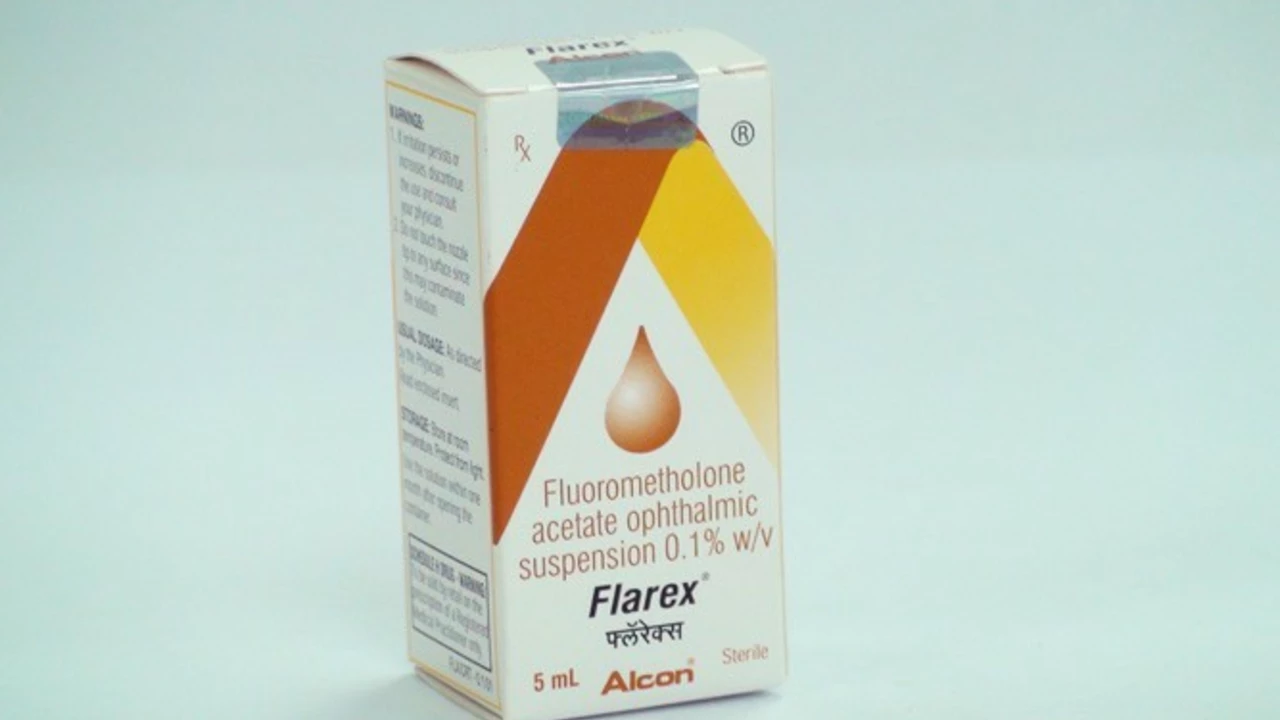Understanding Fluorometholone
The first step to understanding any medication is to know what it is and its primary use. In this case, we'll be delving into fluorometholone. Fluorometholone is a type of corticosteroid medication that is most commonly used in the form of an ophthalmic suspension, or eye drops, to treat inflammation in the eyes. It's designed to reduce swelling, itching, and redness that can be caused by certain eye conditions. As a corticosteroid, fluorometholone works by suppressing the immune response, which in turn reduces inflammation and associated symptoms.
How Fluorometholone Works
Fluorometholone works by suppressing the body's immune response. This is important because inflammation is essentially an immune response. When the body detects harm or injury, it sends out various cells and substances to protect and heal the affected area. This process, while necessary for healing, can also lead to swelling, redness, and discomfort. Fluorometholone stops this response, reducing these symptoms. It does this by inhibiting the release of substances in the body that cause inflammation.
When to Use Fluorometholone
Fluorometholone is typically prescribed for use in treating eye conditions that are causing inflammation. This can include conditions like conjunctivitis (commonly known as pink eye), iritis, keratitis, and some types of corneal injury. It's important to note that fluorometholone is not a cure for these conditions, but rather a treatment for the symptoms they cause. It's also crucial to only use fluorometholone under the guidance of a healthcare professional, as misuse can lead to serious complications.
Applying Fluorometholone Eye Drops
Using fluorometholone as eye drops is fairly straightforward, but it's crucial to do it correctly to ensure the medication can do its job. First, you must wash your hands. Then, tilt your head back slightly and pull down on your lower eyelid to create a small pocket. Hold the dropper above the eye and squeeze out the prescribed number of drops. Close your eye and gently press your finger to the inside corner of the eye for about 1 minute to prevent the liquid from draining into your tear duct. Do not blink or rub your eye during this time.
Potential Side Effects of Fluorometholone
Like any medication, fluorometholone can have potential side effects. These can range from mild to severe. Common side effects include temporary blurred vision, dry eyes, feeling as if something is in your eye, drooping eyelids, and increased sensitivity to light. More severe side effects, though less common, can include vision changes, eye pain, severe redness or swelling of the eyes, and signs of eye infection such as eye discharge or severe discomfort. If you experience any of these, seek medical attention immediately.
Precautions When Using Fluorometholone
When using fluorometholone, there are several precautions you should take. First, make sure to tell your doctor if you have any type of eye infection, as fluorometholone can make infections worse. Also, avoid wearing contact lenses while using this medication unless your doctor tells you otherwise. Furthermore, it's important to not touch the tip of the eye dropper or let it touch your eye or any other surfaces to prevent contamination. Finally, use this medication regularly to get the most benefit from it, but do not use it more often than prescribed or for longer than recommended by your doctor.
Interactions with Other Medications
It's important to know that fluorometholone can interact with other medications. Some drugs can increase your risk of serious side effects while others may affect how well fluorometholone works. Some examples of medications that can interact with fluorometholone include certain types of antibiotics, antifungal medications, and other steroid medicines. Always let your doctor know about any other medications, supplements, or herbal products you are taking before starting treatment with fluorometholone.
Conclusion: The Importance of Professional Guidance
While this guide provides a general overview of fluorometholone, it's important to remember that everyone's health situation is unique. What works for one person may not work for another, and what's safe for one person may not be safe for another. Always seek the advice of a healthcare professional before starting, stopping, or changing any medication regimen. They can provide you with the most accurate and up-to-date information based on your personal health history and current situation.









17 Comments
Yojana Geete
Jul 12 2023Alas the eye’s tempest finally meets its match.
Josie McManus
Jul 21 2023I feel you if you’ve ever fought that annoying red eye feeling, it’s like a tiny war in your socket. The drops can calm the inflammation faster than a chill meme spreads on the internet. Just make sure you follow the doc’s schedule, otherwise you’ll be back at square one.
Heather Kennedy
Jul 29 2023Indeed, the pharmacodynamics of fluorometholone involve inhibition of phospholipase A2, which curtails arachidonic acid synthesis.
That downstream effect dampens prostaglandin and leukotriene cascades, mitigating vasodilation and cellular infiltration.
Clinically, this translates to reduced conjunctival hyperemia and stromal edema.
Adhering to the taper schedule is crucial to prevent rebound inflammation.
Janice Rodrigiez
Aug 7 2023The drops are like a tiny rainbow in a stormy eye, they calm the fire.
Roger Cardoso
Aug 16 2023Sure, but have you considered that the pharma lobby might be pushing steroids to keep us dependent?
barry conpoes
Aug 24 2023Come on, the American spirit thrives on resilience – a few drops won’t ruin our liberty.
justin davis
Sep 2 2023Oh great, another steroid eye drop – because we definitely need more reasons to feel like a science experiment!!!
David Lance Saxon Jr.
Sep 11 2023One could argue that the ocular surface is a mirror of societal entropy, and fluorometholone merely imposes a temporary order upon that chaos.
Moore Lauren
Sep 19 2023Bottom line: use the drops as prescribed, keep the bottle clean, and schedule a follow‑up; that’s the recipe for a smooth recovery.
Jonathan Seanston
Sep 28 2023Hey everyone, just wanted to say the guide does a solid job breaking down the steps.
Sukanya Borborah
Oct 7 2023Honestly, the article repeats the same bullet points twice – lazy editing, but the core info isn’t wrong.
bruce hain
Oct 16 2023While the exposition is adequate, it neglects to emphasize the necessity of monitoring intra‑ocular pressure.
Stu Davies
Oct 24 2023Great summary! 😊 It really helped me understand when to use the drops.
Nadia Stallaert
Nov 2 2023Let us contemplate, dear readers, the profound paradox that a molecule designed to subdue the body’s innate defense mechanisms can simultaneously herald salvation and peril; for in the very act of quelling inflammation, we flirt with the specter of opportunistic infection, an insidious adversary that thrives in the immunosuppressed niche we create! Moreover, the ocular surface, that delicate barrier, becomes a vulnerable frontier when bathed in corticosteroid elixirs, inviting microbial colonization, while the patient, lulled by transient relief, may neglect to report subtle changes, thereby permitting a silent cascade of damage; indeed, the clinician must wield fluoro‑metholone with the precision of a surgeon and the foresight of a prophet, balancing dosage, duration, and vigilant monitoring! Additionally, the pharmacokinetic profile reveals that systemic absorption, though minimal, can exert subtle endocrine effects, particularly in susceptible populations such as diabetics or the elderly, whose homeostatic reserves are already compromised. Consequently, the prescriber’s duty transcends mere administration; it encompasses patient education, meticulous follow‑up, and an unwavering commitment to the principle that every therapeutic intervention is a double‑edged sword, too powerful for the reckless and too delicate for the indifferent. In essence, the judicious use of fluorometholone epitomizes the eternal medical maxim: do no harm, while alleviating suffering, a balance as delicate as the tear film itself.
Greg RipKid
Nov 11 2023Honestly, the long post is a good reminder to stay on top of appointments and watch for any weird vision changes.
John Price Hannah
Nov 19 2023The drama of red eyes finally meets its climax in a bottle of silver‑lined salvation!!!
Echo Rosales
Nov 28 2023Or maybe the whole “silver‑lined” narrative is just a marketing gimmick, and we should stick to plain facts.